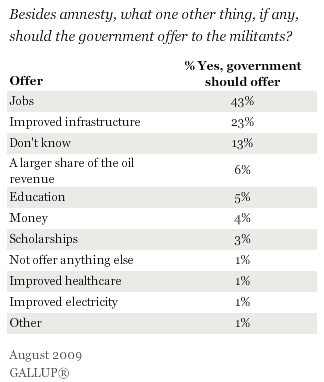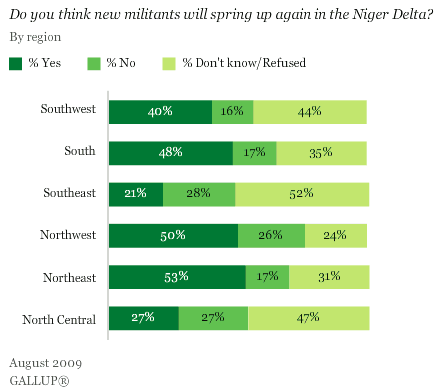LONDON -- The fate of Nigeria's militants is unclear now that their amnesty from the Nigerian government has expired. In August 2009 -- just after the initial amnesty offer -- Gallup asked Nigerians what one other thing the government should offer to the militants. More than two in five Nigerians (43%) volunteered "jobs." While the Nigerian government has committed to providing education and job training, 5% of those surveyed mentioned the former and none specifically volunteered the latter as the one thing the government could offer militants.

The Gallup data show that Nigerians see jobs as a key component to maintaining peace in the Niger Delta. Nearly twice as many of those surveyed mention jobs as mention the next most common response -- infrastructure -- with 23% saying the government should improve things such as boreholes, roads, and schools in the Delta. This is in contrast to the government's offer of a cash payment, an education, and job training to militants in the region.
Since 2006 militants in the Niger Delta have attacked oil installations in the country in a battle against government forces. The unrest has cut Nigeria's oil production by about 1 million barrels a day, making way for Angola to become Africa's top oil producer. Since the failure of another amnesty offer in 2004, Nigeria has not only had to deal with militants in the Delta, but also growing discontent in the Muslim-controlled North. Jobs, this time around, appear to be a crucial issue as the 2004 offer failed, in part, because the militants found no jobs waiting for them.
Two things that the government offered, money and education, are not high on the list of what Nigerians surveyed say the government should offer militants, with only 4% mentioning money and 8% mentioning either education (5%) or scholarships (3%).
At the regional level, Nigerians continue to prioritize jobs for militants. A majority of Nigerians in the Northeast region (53%) mention the government should offer jobs to militants, the highest percentage among all six regions. Just as with the nationwide data, the second most mentioned item in all regions is improving infrastructure in the Niger Delta.
Will New Militants Spring Up?
With a history of a failed amnesty offers, nearly equal numbers of Nigerians surveyed in August say new militants will spring up after the amnesty (40%) or didn't offer an opinion (39%). Across the country, however, there are differences in opinion. Residents of the Northeast (53%), Northwest (50%), and South (48%), which includes the Niger Delta, are more likely to think new militants will return. However, in several regions, including the Southeast (52%), the North Central (47%), and the Southwest (44%), large percentages didn't have an opinion as to whether new militants will arise.

Bottom Line
With the end of the amnesty and the next steps of government and militant interaction yet to be decided, the data indicate Nigerians see providing jobs to the militants as the government's next priority. Whether from the areas nearest the Niger Delta or areas in the North, Nigerians put jobs above all else in terms of what the government should offer the country's former militants.
Nonetheless, the prospect that militants will spring up remains a possibility in the minds of many Nigerians, among whom 40% indicate they think this will happen and another 39% who say they aren't sure. Even with the main militant groups agreeing to the amnesty, the future of the Niger Delta remains cloudy in the minds of many Nigerians.
For complete data sets or custom research from the more than 150 countries Gallup continually surveys, please contact worldpollpartners@gallup.com or call 202.715.3030.
Survey Methods
Results are based on face-to-face interviews with 1,000 adults, aged 15 and older, conducted in August 2009 in Nigeria. For results based on the total sample of national adults, one can say with 95% confidence that the maximum margin of sampling error is ±3.6 percentage points. The margin of error reflects the influence of data weighting. In addition to sampling error, question wording and practical difficulties in conducting surveys can introduce error or bias into the findings of public opinion polls.
